5 impacts of manager skill on team performance

The impact of manager skill on team performance is huge in my view. I have been managed by some amazing managers and some terrible ones. My motivation, my ability to get things done, my understanding of direction and host of other areas was massively different with the best skilled managers compared to the worst.
I am sure you have your own similar experiences and stories.
I am sharing with you 5 impacts of manager skill on team performance. For each I list examples of what to do and what not to do. I include what the impact of getting it right or getting wrong means for the team and business.
As we go through each impact of manager skill, I share management best practices. Please put as many of these into practice as you can. I promise your career and your team will thank you for it.
5 impacts of manager skill on team performance are:
- Setting & Maintaining Direction
- Being Controlling vs Creating the right Environment
- Removing Blockages Quickly
- Motivating and Engaging Employees
- Managing the politics and forces impacting the team
Watch on YouTube
Listen on Podcast
Setting & Maintaining Direction – The First impact of manager skill on team performance
The easier part is setting direction
This is mainly about the communication skills of the manager.
A manager who struggles with communication might regurgitate to the team parts of the company strategy or what their manager has asked them to say. The team might leave the session with an idea of what is needed but may not remember this for long.
The better managers, put the goals and directions into their own words, make the goal relatable to the team members and talk about why this direction is important and how the work each of the team members do is important to the direction and goals the team has. Clear goals are set and agreed on. Team members leave with a clear idea of what is needed and a good sense of their part in achieving it.
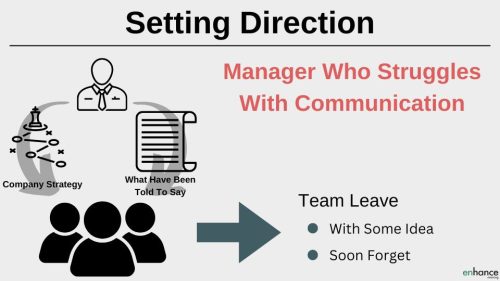
Next – the harder part which is:
Maintaining the focus on the direction set
The managers with less skill, don’t do much to keep the direction in the minds of their team. They may even forget about the original direction themselves.
The skilled managers, keep talking about the direction and goals needed, put the goals on whiteboards, track progress against them, talk about them in meetings etc. They are constantly reminding the team of the direction and goals. The team are constantly being told these goals are important, so they keep their efforts focused on achieving these goals.
Think about the impact of the two approaches outlined.
A group of individuals doing what they think is right – will produce is a lot less – than a team moving towards common goals. You have probably experienced this yourself. Just take a look at all the stats – up to 90% of strategy implementation fails. Per Harvard Business Review, most strategies only deliver 63% of their potential financial performance – the key reasons for success or failure boil down to manager skill during implementation
Finally per ScienceDirect – direction and goal setting improve worker performance by 12-15% without additional financial incentives.
Poor, untrained and unskilled managers waste a lot of precious time and resources that could be used up to 37% more productively. Work out what that is costing your business.

Being Controlling vs Creating the right Environment (Impact 2)
Great managers flex their management style and approach to get the best from the team with the situation they face. Less skilled to poor managers tend to stick to what they know or like or what suits their needs and wants with much less regard for the team or situation.
A controlling or directive approach to management is telling staff what they are going to do – providing detailed plans and explanations of the tasks employees need to complete. The employees don’t need to think or input – just do as they are being asked. This may work well in a crisis or with low skilled employees that are doing tasks for the first time.
Imagine using this approach – in normal conditions – with individuals that want to think, solve problems, and grow their skills. It would be an absolute disaster. Motivation would be rock bottom, retaining your team would be very hard and the team output would be seriously limited. The cost to the business is significant – the cost of losing employees is around their gross annual salary assuming you can hire someone as good. Then you have the cost of not hitting targets. The costs of poor management for a team of ten say, could quickly pass £100,000 in a year.
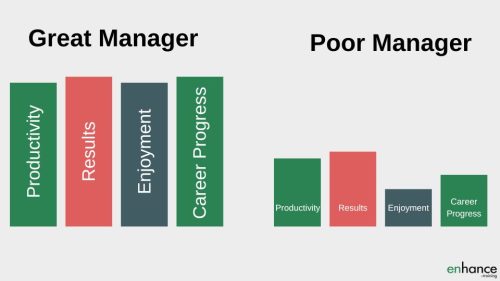
Reasons for Incorrect Management Styles
There are lots of reasons managers incorrectly adopt micromanage or directive approaches – insecurity, lack of confidence, lack of alternatives or lack of training. Teaching the manager different styles of management and when to use each style or combination of styles helps the manager and saves the company hundreds of thousands in additional costs and lost opportunity.
When managing staff that want to put their skills to use, to think, to contribute and to learn more, focus on creating clear direction and the right environment for them to achieve these aims. Provide high levels of support, feedback and mentoring. Ask team members to solve problems rather than do tasks. Work to create open communications, realism and teamwork.
This quote by Steve jobs sums it up for me “It doesn’t make sense to hire smart people and then tell them what to do. We hire smart people so they can tell us what to do.”
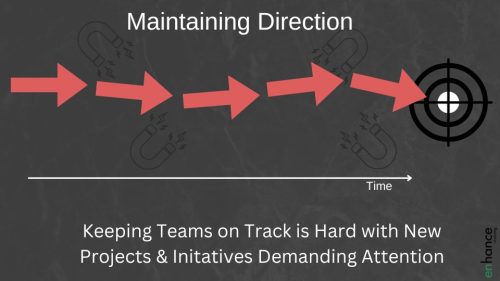
Removing blockages quickly – The third impact of manager skill on team performance
Blockages for team members come in lots of different guises – from lack of skills in team members, to staff running outdated or inefficient processes, to team members in conflict or having to deal with underperforming or difficult staff within the team.
Blockages are anything that stops individuals in the team consistently doing their best work.
Poor, unskilled or those managers lacking confidence often don’t take action or delay taking action to remove these blockages. Say they have a disruptive member of staff. An unskilled manager might have a conversation or two – which the disruptive staff member effectively ignores. The unskilled manager is not sure what else to do so continues to put up with the problems.
Or maybe they get so frustrated or are pressurised by team members or management and then suddenly fire them. Both approaches negatively impact the team members – lower morale, lower motivation and engagement, frustration, fear of making mistakes… and as a result the team performance heads downwards. Team members might start leaving … the problems become worse and your career in this company as a manager becomes stuck or goes into reverse.
The Cost to the Business is High
Less is produced, more mistakes made, increased absenteeism, trust of the team’s output reduces around the business, higher staff turnover – the costs can quickly move into the hundreds of thousands.
The skilled manager is constantly looking out for blockages and problems. As soon as they are spotted, the skilled manager investigates, creates a plan and then takes action or does these steps with the team. The problems are removed quickly, further increasing the team’s motivation and trust in the manager.
For a disruptive member of staff, the skilled manager keeps increasing the pressure on them to change so that they either change or leave. The skilled manager also provides support to increase the likelihood of the person changing. The skilled manager is careful to demonstrate fairness and gradual but firm action, thus reassuring other team members that poor behaviour will be dealt with fairly and firmly.
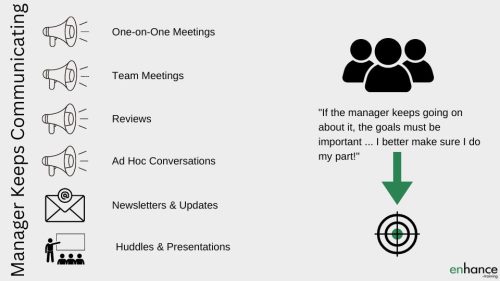
Motivating and engaging employees (Impact 4)
Employee engagement and motivation matter to the businesses and here are four stats from OfficeVibe to prove the impact of manager skill of team performance:
- Highly engaged business units result in 21% greater profitability.
- Highly engaged business units realize a 41% reduction in absenteeism and a 17% increase in productivity.
- Companies with engaged employees, outperform those without by 202%.
- Highly engaged business units achieve a 10% increase in customer ratings and a 20% increase in sales.
We all know from experience that a motivated and engaged team is more enjoyable to work in and they produce more.
Highly engaged teams are created because of the impact of manager skill. The leader or manager of the team plays a huge part in how their team behaves and how engaged they are.
Highly skilled managers know that creating the right environment though pursuing positive management practices makes a huge difference.
Good Management Practices
Skilled managers know how implement and consistently do implement practices like:
- Being authentic and being themselves as a manager
- Explaining their vision and the Why to the team
- Setting clear direction and goals with the team
- Practicing open communication
- Actively listening to team members
- Giving feedback consistently to help everyone improve
- Regularly praising good choices, actions and results
- Investing significant amounts of time to develop the skills of team members
- Promoting from within where they can
- They use failure as a learning tool rather than a reason to punish
These management practices contribute to creating a very positive supportive environment which encourages the best work from employees
The less skilled to poor managers either don’t understand or believe that these management practices significantly increase motivation when implemented well. Or these managers don’t want to implement and practice them because their personal needs, beliefs or reference points are in conflict with these practices.
Training managers in good practice management techniques is an important starting point to enable those managers to improve their approach, practice the right skills early in their management careers and to gain confidence in doing so.
Managing the politics impacting the team – The fifth impact of manager skill on team performance
Within every company, there is competition for staff time and the resources the company has. Each department will have more projects and ideas than they can realistically implement. On top of this, each leader of the business and manager within the business will have their own priority list of which projects and activities should come first.
For instance, if the dominant leader in the business comes from a sales background, the company might be focused on winning contracts and growing revenue. This might take precedence over winning profitable contracts and thus growing the profitability of the business – as a result of a lack of visibility or a lack of knowledge – in how to drive profitability.
Each team will have various political forces pushing or pulling them in different directions and trying to influence how they use their time and resources to move the business forward. Different projects will take priority each month, which in turn puts changing priorities on each team.
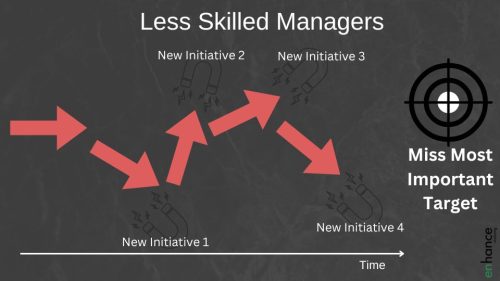
Being Pulled Off Course
The less experienced to poor managers will allow those forces to drive their own priorities. These teams are very reactive and can easily get pulled from pillar to post. The managers don’t question and challenge enough of the requests coming to the team from around the business. Finishing each project or request is very hard in this situation and many only get half finished. This creates a lot of wasted effort and inefficiencies. The impact of manage skill on team performance or lack of it can be significant in wages spent for no output gained and in terms of what could have been achieved but was not – i.e. the opportunity cost.
Staying Focused on The Most Important Goals
In contrast a skilled manager will keep the teams goals and company strategy in mind when responding to requests to change direction, to prioritise the latest initiative etc. The skilled manager will ask a lot more questions and challenge what is really needs to be produced to meet company goals. Consistently going through this process results in the team being able to focus on more of their projects for longer, increasing what is completed and reducing what is wasted effort. The impact of manager skill results in a lot more being delivered
The more skilled managers have the confidence, the expectation management and political skills to effectively challenge others and defend their team members. Protecting the team and providing consistent direction is very motivating for team members, further increasing output. A win-win situation for all.
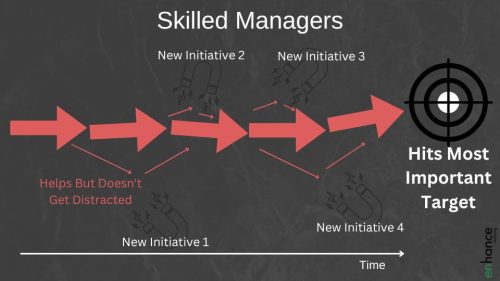
So we have explored 5 impacts of manager skill on team performance. There are many other areas that are directly or indirectly impacted by manager skill.
in summary
In summary, the skills, confidence and approach of managers make a massive difference to the performance of any given team and the overall performance of the business.
Individuals are promoted into management positions because they demonstrate skills and potential to get the best out of their team members. The better they deliver against this expectation, the more people they end up managing and the more influence and impact they on the business.
Far too many businesses rely on – manager to direct report mentoring – to pass on vital management skills. Invest in structured training your management team members. Equip them with the tools and skills so they can do a better job of managing and motivating their teams. The cost of having managers within your business unsure of how to or unable to effectively tackle the range of challenges they will come across is vastly higher than any management training course or coaching programme.
Take a look at our management skills accelerator programme as a route to properly equipping your managers with effective management skills.

The approach a manager takes and the skills they employ have a huge impact on team performance. I am sure you have experienced this yourself.
It can be a trickly balancing act between asking for help and development versus doing the job well enough to keep it and be promoted. Showing weakness in some organisations is career limiting. If this is you – be more creative in how you speed up your learning rather than put learning on the back burner.
There is a huge amount you can learn from others. I was very lucky to have worked with some amazing managers that enjoyed teaching.
Look after your own development and the speed of which you progress your skills. Don’t rely on organisations to provide for you.








